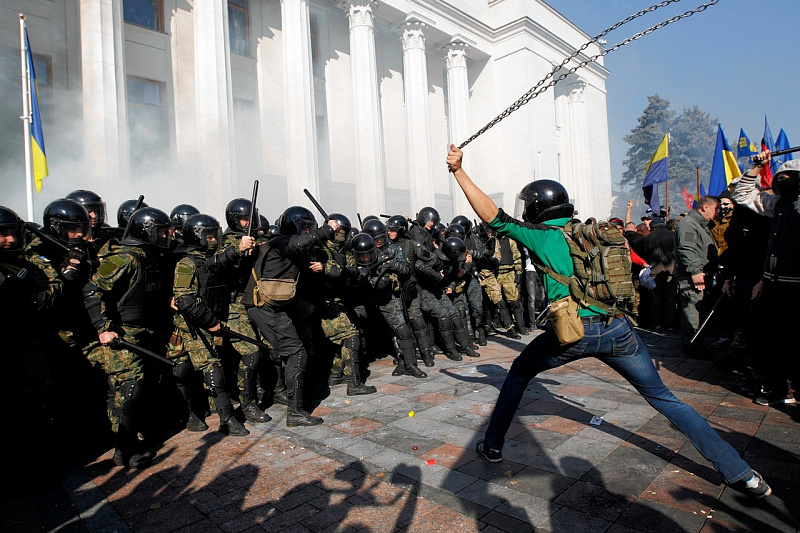A Pragmatic Approach to Peace in Ukraine
In
Log in if you are already registered
In 2013, conflict began to boil when the former Ukrainian president, Viktor Yanukovych, put off an agreement between Ukraine and the European Union, which was interpreted as choosing Russia over “the West.” Very shortly thereafter, the Euromaidan revolution occurred, with pro-Western Ukrainian nationalist forces overtaking the Ukrainian government. This did not occur without consequence however, and a fierce pro-Russia movement in Ukraine emerged. In 2014, the people in Crimea voted to secede from Ukraine, subsequently joining Russia, while fervent protests engulfed eastern Ukraine.

Reuters
In Donetsk and Lugansk, these protests eventually led to flat-out conflict. In April 2014, pro-Russian protestors took control of the regional Ministry of Internal Affairs building in Donetsk and demanded to hold a referendum to join the Russian Federation. The referendum was never held, but the group managed to take control of the oblast, turning it into the People’s Republic of Donetsk. Likewise, in Lugansk, protestors raided their regional administration building to make several demands to the Ukrainian government, which eventually resulted in the holding of their own referendum, creating the Lugansk People’s Republic. The Ukrainian government regarded this action as terrorism and troops were deployed. The war consisted of battles for control of regional centers, such as the Donetsk International Airport. Still, other measures, such as air strikes, were also utilized by the Ukrainian government. Halfway through 2014, the conflict changed nature when the Ukrainian government claimed that Russia began to interfere and support the rebels. They claim that the Russian government provided armament, volunteers, and tanks to the breakaway states. This alleged support held off the Ukrainian push to retake the territory, and the conflict has become cold ever since.
While multiple ceasefires have been initiated, it needs to be understood that such measures are nothing more than a superficial remedy to the symptoms of an ailment, and not a remedy to the ailment itself. Ceasefires do not address the root of the issue: the dispute over territorial sovereignty between the republics and Ukraine. This explains why most of these ceasefires have failed and there are still occasional skirmishes, with 100 people being killed in 2020.1
As is true with many territorial disputes, the territorial sovereignty of Donetsk and Lugansk is zero-sum in nature. The conflicted republics seek complete autonomy from Ukraine, and Ukraine considers the territories to be within its jurisdiction. So long as this territorial dispute exists, the conflict is bound to escalate without one side or the other capitulating. In his article about de-facto states, Dr. Sergey Markedonov argues that the resolution of boundaries throughout the transition period following the USSR disbandment is not complete. He states that, “Thus, the process of ethnic self-determination accompanying the Soviet collapse is not finished. This stage in history will not be complete until there is successful conflict resolution and all newly established borders are recognized as legitimate.”2 Thus, without a proper resolution to this conflict and the acceptance of territorial legitimacy by one side or the other, peace is not possible in the long run.
The function of this article is not to discuss who is in the right or wrong regarding the territorial ownership of eastern Ukraine, but instead to discuss the practical way in which peace can be sustained, which should be the goal of Ukraine. The moral debate is a completely separate question and goes beyond the scope of pragmatic analysis into the realm of philosophy and abstraction.
To address this issue practically, the real characteristics of the countries supposedly involved in this dilemma need to be understood. As this article is primarily concerning Ukraine, the Ukrainian assumption that Russia has supported and will potentially continue to support the Russian-speaking People’s Republics will be held, as Ukraine genuinely believes so.
Russia is, and has historically occupied a position as a great world power. Russia boasts its rich historical background and influence, its sheer size and abundance of resources, and its staggering economic output, the 6th largest economy in the world when adjusted for purchasing power parity.3 Lastly, Russia has the second strongest military in the world,4 a variable that is quite pertinent to the Ukraine conflict question.
Humility, from a realist point of view, can roughly be defined as understanding one’s place in the natural order of things. With all due respect, Ukraine is a small country with a small military and a relatively weak economy. It pales into comparison to the world power it believes it is facing.
When analyzing a situation in which there is a real difference in power between two parties, peace does not always mean that both parties’ interests are going to be met, especially when they are competing over a zero-sum domain.
Imagine a situation in which there is a schoolyard bully. This bully takes the lunch of a weaker schoolchild. The child is understandably upset because his interests have been violated, but if the goal is peace, the child needs to tread lightly. Peace on the playground does not come from trying to equip the child to take his lunch back, because that is an impossibility due to real differences in power, but instead peace comes from teaching the child to coexist with the bully. Likewise, when there exists a real tangible power difference between two states, such as Ukraine and Russia, peace comes from the understanding on the Ukrainian side that their desire to violate Russia’s new sphere of influence is a fool’s errand, and that true peace can only come from coexistence and acceptance of the situation.
Therefore, the last thing that Ukraine should be doing if it wants peace is provoke Russia. Currently, there are many policies by the Ukrainian government that are doing nothing more than stirring the pot. It can be argued, for example, that the recent tensions at the Ukrainian border between Russia and Ukraine, were directly caused by the fact that the Ukrainian government blocked water access to Crimea seven years ago.5 Likewise, Ukraine has blocked access to retirement benefits for pensioners in Donetsk and Lugansk, specifically 450,000 out of 1.2 million pensioners in Donbass.6 The United Nations even made note of this in their 2019 Ukraine human rights report, stating that “no practical mechanism has yet been established” to ensure that these individuals receive their retirement benefits.7 The prospect of receiving one’s pension was made even more difficult during the COVID-19 pandemic, when Ukraine implemented a requirement for people coming from Donbass to self-isolate for 14 days to receive their pension.8 Such measures not only indicate apparent hypocrisy, because the Ukrainian government is treating citizens who they claim to be Ukrainians with evident hostility, but also a propensity to spur further conflict.
There is, of course, the oft-cited idea by Western scholars that Ukraine should turn to NATO to win the Donbass region back. However, it should be noted that these recommendations rely on the assumption that Russia is weak enough to be deterred by the West, and that the West is sufficiently motivated to help Ukraine. Neither seem very likely. The contemporary Russia, while certainly willing to cooperate, has demonstrated a track record of pursuing its interests in spite of the norms and consequences of Western countries. If this were not the case, Crimea would never have been adopted into the federation. Secondly, from a realist point of view, it does not make much sense that helping Ukraine is in the self-interest of many Western states. To go into conflict with Russia or to worsen relations with Russia over a small state that has traditionally been within Russia’s sphere of influence would incur a massive marginal cost with very little marginal benefit. In fact, the marginal benefit would probably be non-existent. The days of the Cold War constructivist foreign policy appear to be behind us, and without a unified anti-Soviet foreign policy grounded in ideology and not realpolitik, the idea that Ukraine should turn to NATO seems rather foolish.
Thus, the only solution for peace in Ukraine is for Ukraine to take a humble look at the situation, to accept its position in world politics, and to stop provoking the country it perceives to be a threat, expecting the West to bail them out.
1 - ACLED: Bringing Clarity to Crisis. Regional Overview: Europe 6-12 September. ACLED, 2020. https://acleddata.com/2020/09/17/regional-overview-europe6-12-september-2020/.
2 - Markedonov, Sergey. De facto statehood in Eurasia: a political and security phenomenon. Caucasus Survey, 2015. https://www.tandfonline.com/doi/full/10.1080/23761199.2015.1086565.
3 - The World Bank. GDP, PPP, (current international $). The World Bank, 2019. https://data.worldbank.org/indicator/NY.GDP.MKTP.PP.CD.
4 - BusinessInsider. This is how the US and Iran rank among the world's 25 most powerful militaries. BusinessInsider, 2020. https://www.businessinsider.com/most-powerful-militaries-in-the-world-ranked-2019-9.
5 - Marques, Clara Ferreira. Crimea’s Water Crisis Is an Impossible Problem for Putin. Bloomberg, 2021. https://www.bloomberg.com/opinion/articles/2021-03-19/russia-vs-ukraine-crimea-s-water-crisis-is-an-impossible-problem-for-putin.
6 - Human Rights Watch. Ukraine: People with Limited Mobility Can’t Access Pensions. Human Rights Watch, 2020. https://www.hrw.org/news/2020/01/24/ukraine-people-limited-mobility-cant-access-pensions.
7 - Office of the United Nations High Commission for Human Rights (OHCHR). Report on the human rights situation in Ukraine 16 August to 15 November 2019. OHCHR, 2019. https://www.ohchr.org/Documents/Countries/UA/28thReportUkraine_EN.pdf.
8 - Human Rights Watch. Ukraine: Covid-19 Rules Blocked Access to Pensions. Human Rights Watch, 2020. https://www.hrw.org/news/2020/08/03/ukraine-covid-19-rules-blocked-access-pensions.
Student in multilateral diplomacy at the Moscow State Institute of International Relations (MGIMO). He has a bachelor’s degree in economics
Blog: Kristian Fors's blog
Rating: 0




